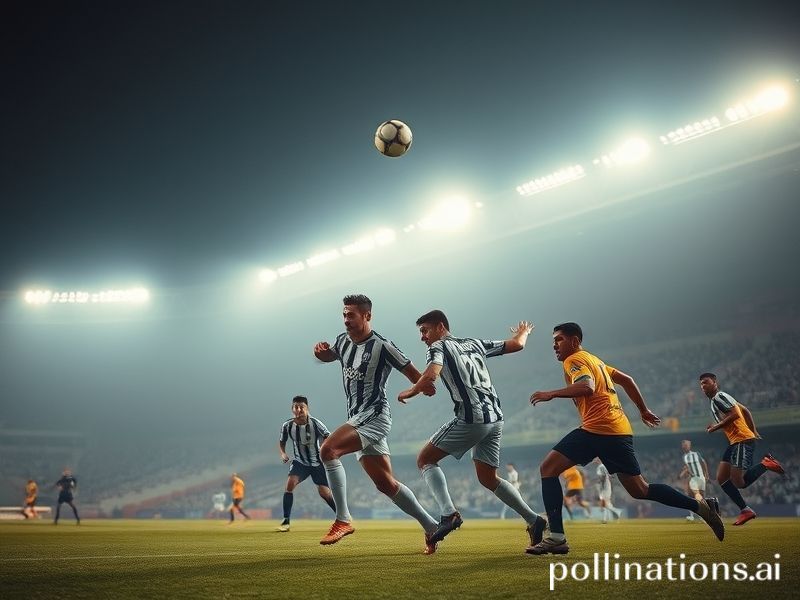Botafogo vs. Mirassol: How a Tuesday Night in Rio Explains the Collapse of Everything
Botafogo vs. Mirassol: The Quiet Apocalypse of a Tuesday Night in Rio
By Dave’s Locker International Desk
If you squint hard enough—past the floodlights, past the cocaine-laced energy-drink sponsorship banners—you can almost see the geopolitical fault lines tremble beneath the Maracanã turf. Botafogo versus Mirassol, a mid-table Campeonato Carioca fixture that barely registers on the Bloomberg Terminal, is nevertheless a perfect X-ray of our late-capitalist epoch: all spectacle, no anesthesia.
Picture the scene. On one side, Botafogo: the Rio grande dame who once signed Garrincha and today signs NFTs. Their last balance sheet reads like a Hemingway suicide note—debts indexed to dollars, euros, and whatever cryptocurrency the sporting director’s nephew is mining this quarter. Across the halfway line stands Mirassol, a club from the interior of São Paulo state whose Wikipedia page still carries banner ads for a 2013 agricultural expo. Their wage bill is roughly the cost of one PSG substitute’s designer hair gel, yet here they are, ready to jab the established order in the eye with a subsidized bus ticket and a dream.
To the uninitiated, this looks like a quaint domestic cup tie. To the seasoned observer, it’s the global economy in cleats. Botafogo’s squad is a United Nations of short-term mercenaries—Colombian wingers escaping cartel headlines, Portuguese midfielders fleeing the existential dread of the EU austerity hangover, and a goalkeeper on loan from a Ukrainian club whose stadium is currently doubling as a refugee shelter. Each transfer a geopolitical lifeboat, each salary a remittance that keeps some distant village’s lights flickering for one more month.
Mirassol, meanwhile, is the anti-globalization protest you can actually bet on. Their starting eleven is assembled from academy graduates and bargain-bin Brazilians rejected by bigger clubs for “lacking marketable hair.” Their coach is a former physio who still tapes ankles between tactics talks. They travel without an analytics department because the analytics department is a 17-year-old intern with a cracked iPhone and a pirated Wyscout login. Somehow, they win more duels than Davos wins headlines.
The match itself unfolds like a Twitter thread written by a sleep-deprived philosophy major. Botafogo dominate possession, caressing the ball in hypnotic triangles that would make Pep Guardiola weep into his tactical turtleneck. Yet every attack dies in the final third, smothered by a Mirassol back line that defends the way Swiss banks defend client confidentiality—cold, efficient, utterly indifferent to moral outrage. The first half ends 0-0, and the stadium Wi-Fi crashes under the weight of 30,000 doom-scrolls checking crypto prices and distant artillery barrages.
Second half: entropy arrives wearing neon boots. Botafogo’s captain, a center-back who once captained Ajax but now captains despair, misplaces a pass that would shame an MLS expansion franchise. Mirassol counter with the urgency of a tax refund. Their striker, a 19-year-old who lists his hobbies on Instagram as “Jesus, family, and avoiding kidnapping,” slots the winner with the nonchalance of someone who’s seen worse in traffic jams. The traveling fans—exactly 1,247 of them, according to the state police—erupt as if they’ve just nationalized an oil well.
Final whistle. Mirassol 1, Botafogo 0. The scoreline will be forgotten by Thursday, yet its parable lingers. In a world where hedge funds treat football clubs like volatile ETFs, where oligarchs launder reputations one sponsorship at a time, the small-town underdog still has enough rage to flip the Monopoly board. For ninety-odd minutes, debt ratios don’t matter, only ratios of heartbeats per sliding tackle. And somewhere in the VIP box, a Botafogo executive checks his phone and discovers that the tokenized stadium-seat NFTs he issued last month are down another 12%. He sighs, orders another açaí-spiked prosecco, and reassures himself that at least the collapse is carbon-neutral.
As the floodlights dim, the crowd files out past murals of forgotten idols and QR codes for antidepressant discounts. Rio’s hills flicker with the eternal neon promise of tomorrow’s gamble. Botafogo licks its wounds; Mirassol boards the overnight bus back to the interior, where reality is cheaper. The planet keeps warming, the markets keep wobbling, and the beautiful game keeps pretending none of it is happening—one Tuesday night apocalypse at a time.







